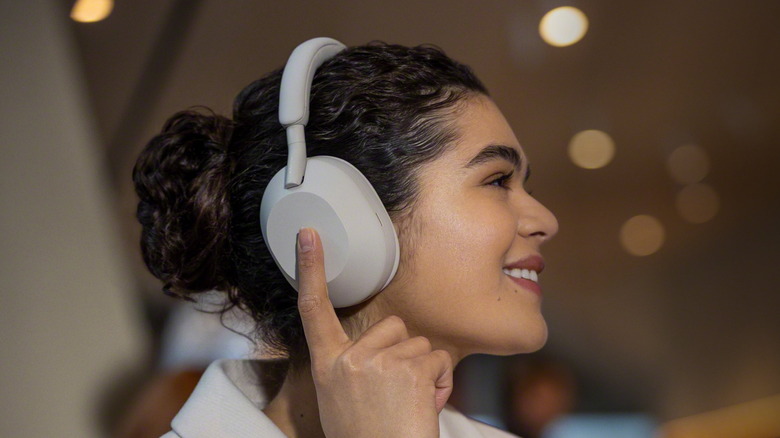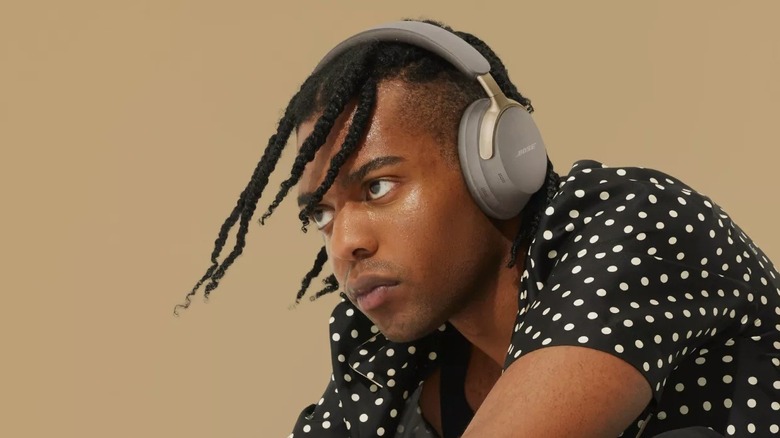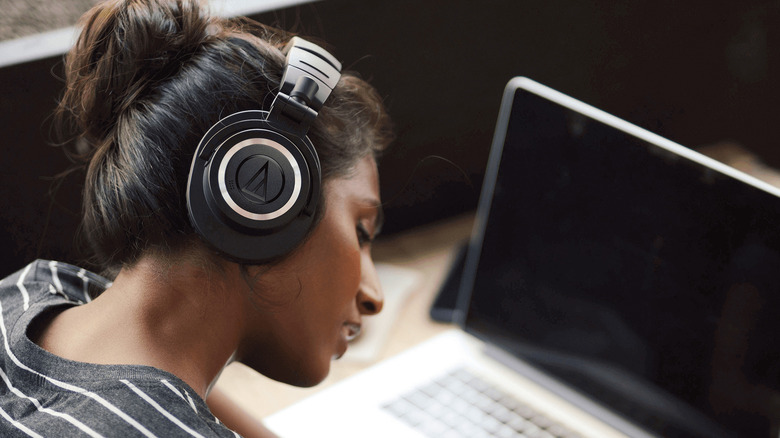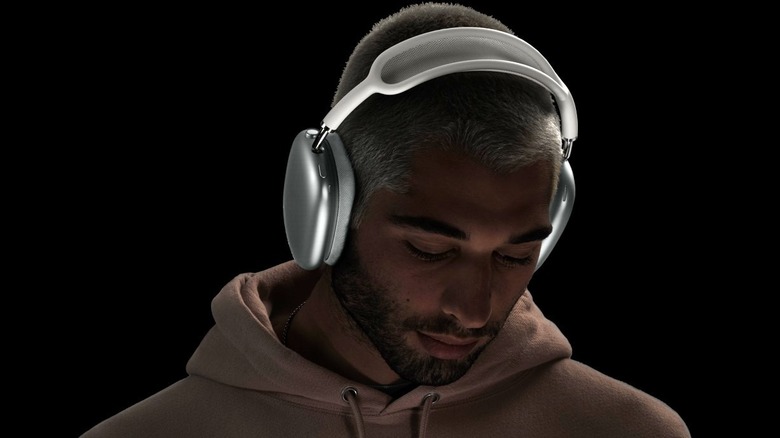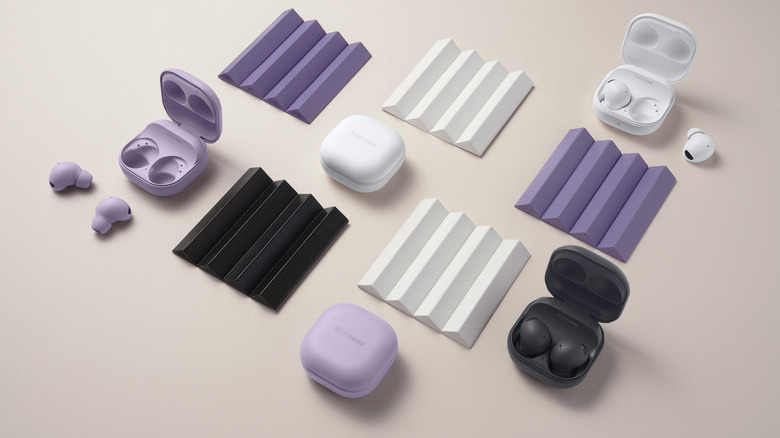5 Of The Best Bluetooth Headphones In 2024
We're living in a golden age of wireless audio. Ever since Apple removed the headphone jack, prompting the rest of the smartphone industry to follow suit, we've relied on wireless earbuds and headphones to get our music fix. That's not entirely a bad thing. This means more people are using high-quality headphones rather than cheap, awful-sounding earbuds that used to be packaged with our phones. But as Bluetooth headphones get more popular, terrible products flood the market from brands hoping to make a few bucks off the trend. It can be difficult to sort through the noise and find the best headphones for you.
It's not just the sheer volume of headphones that makes it difficult to choose a pair. You've also got to sort through a mountain of features. Do you need active noise cancellation? What about high-quality Bluetooth codecs? Do you really need to empty your wallet for a great pair, or are there hidden gems at reasonable prices?
As an audio engineer and admitted audiophile, I've tested too many headphones to count, taking note of their sound and features, comfort, battery life, and more. Based on my hands-on testing and a decade-plus of experience with high-grade audio equipment and audio engineering, here are five of the best Bluetooth headphones you can buy in 2024. A more in-depth explanation of our methodology will be provided at the end of the article.
The best overall: Sony WH-1000XM5
If you're simply looking for the best pair of Bluetooth headphones, look no further than the Sony WH-1000XM5, but be ready to shell out for the privilege. The marquis feature here is ANC, with Sony consistently having some of the best noise canceling in the business. I've found that although it can't block out everything in my dense city environment, not much gets through when you've got music playing. It's a bit surreal to hear the world melt away as the XM5s power up.
The sound on the WH-1000XM5 is tuned to a consumer target. I found the bass far too overpowering out of the box, and I'd describe the overall sound as unacceptably muddy. Many people enjoy that sort of rumble, but I can't stand it, especially since I already listen to bass-forward music. However, using Sony's Smart EQ feature, I was able to tune the headphones to my liking, creating a more balanced profile. Bass still thumps, but highs are more prominent, and mids have breathing room. The WH-1000XM5 excels at injecting color into audio. "Gangsta" by Free Nationals feels expansive on the wide soundstage, and the catchy bass guitar riff at the center of the hook hangs inside the ear with a pleasant weight.
EQs aside, the WH-1000XM5 has plenty of useful smart features. Spatial audio may appeal to some, though personally, I don't like the way Atmos mixes sound. Transparency mode works well for quick conversations and navigating pedestrian traffic. Google Assistant or Alexa are a tap away after in-app setup, and smart pause/play when removing the headphones is nice to have. Multipoint connectivity is also great to have for connecting to a phone and laptop at the same time. Additionally, battery life is excellent, lasting well over a full workday.
An alternative: Bose QuietComfort Ultra
If you're not the biggest fan of Sony's top-end ANC Bluetooth headphones, you might instead prefer the pair Bose most recently cooked up. The QuietComfort Ultra is Bose's most premium wireless offering, competing directly with Sony and Apple for the crown of best ANC cans.
The sound on the QC Ultra is quite good, although I prefer what Sony and Apple have done with their respective headphones. I'd describe the sound of the QC Ultra as consumer-friendly. For the majority of users, it's more than enough to satisfy, and Android users with newer phones can take advantage of Snapdragon Sound support with Qualcomm's aptX codec. The expansive soundstage helped the shimmering synths in ODESZA's "Say My Name" stand apart from the vocal chops and ensured that the mid-bass range stayed firmly in the cabinet.
Of course, Bose is well-known for its pioneering role in popularizing ANC technology, and the QC Ultra doesn't disappoint on that front. They tame low-end noise more consistently than do the XM5s or Apple AirPods Max and take out a lot more mid and top-end frequencies. Additionally, I like the mix of controls here, especially the capacitive volume slider. Ultimately, preference between these and the Sony WH-1000XM5 comes down to price. Sony's premium headphones cost just shy of $400 and are consistently on sale at this point in their product cycle, while Bose's offering is $430. But while the Bose cans outperform Sony on ANC, they can't match Sony for sound or feature density.
The best on a budget: Audio Technica ATH-M50xBT2
For years, audio professionals have loved Audio Technica's ATH-M50X headphones for professional music mixing and mastering. As professional monitoring headphones, they're tuned to a flat signal, not a consumer target. That means when you listen to a song, you're hearing something very close to what the artist heard while mixing. In fact, there's a decent chance some of your favorite songs were mixed by someone wearing a pair of M50X cans. Moreover, they sound incredibly accurate for their entry-level price point. So, it was a genius move for Audio Technica to release the same pair of headphones in a Bluetooth variant. At only $200, the ATH-M50xBT2 are only slightly more expensive than their wired counterpart, making them a great overall value proposition.
Having rocked a pair of ATH-M50Xs for many years, I only recently picked the M50xBT2 up from my local computer shop. When I tested them with some of my songs on the wired and Bluetooth variants, I struggled to notice a difference. The sly bassline of an unreleased song sounds just as catchy in both pairs, and the arpeggiated stabs that layer the top of the mix can be clearly heard at the back of the soundstage. While streaming Moderat's exquisitely airy "MORE LOVE" from Tidal at 24bit/44.1kHz, the slightly fried vocals floated nicely above the glitchy synth beds and crunchy bass swells. LDAC is blessedly supported here, but there's no aptX.
Of course, the M50xBT2 does not offer active noise cancellation or any smart features. These just aren't that kind of headphones. However, without those power-hungry features, the M50xBT2 has excellent battery life. I can forget to charge this pair of headphones for days without worry.
Best for iPhone: Apple AirPods Max
Look, you probably saw this one coming. Sure, iPhone owners can choose any of the other headphones on this list, but why would you when Apple has engineered a worse experience for its competitors' products? The iPhone doesn't support alternative high-resolution Bluetooth audio codecs like LDAC or aptX, so no matter which headphones you pick, you're locked into Apple's AAC codec.
When it comes to the fundamentals of sound, ANC, comfort, and battery life, the AirPods Max check all the boxes. Comfort is a low point since Apple opted for metal rather than plastic in its design. As I've only had the opportunity to test a friend's pair of AirPods Max and only for about an hour, I can't speak to how they'll feel after marathon listening sessions. However, the ANC is excellent and nearly on par with Bose or Sony, and I'm told the battery life is also decent, lasting a couple of workdays before needing to top up.
Sound is great, too, and although I prefer the Sony and Bose, I didn't have the chance to meddle with EQing the AirPods Max, so I'll give them the benefit of the doubt. The stock EQ still delivers a mostly balanced mix that I quite enjoy.
Honestly, the only reason people are locked into Apple's ecosystem and should choose any other pair of headphones is price. I don't know how Apple justifies charging a whopping $500 for these things, especially when they barely match the other top-end competition in features and sound quality. I suppose what you're paying for is the luxury of a headphone that works seamlessly with your other Apple products.
A compact alternative: Samsung Galaxy Buds2 Pro
Other headphones on this list are, well, headphones. They're big, and you have to put them around your neck or in a bag when not in use. But if you're looking for a great-sounding Bluetooth option in the earphones category, you don't need to look any further than Samsung's top-end Galaxy Buds2 Pro. Having used these since the day they first came out, I've never thought the grass was greener in another earbud pasture.
The sound of the Buds2 Pro is best described as clear. It almost perfectly maps to a Harmon target, with my only gripe being the dip in highs between the 8-10K range. What this means for non-nerds is that these true wireless buds have punchy bass, clear mids, and clean highs, even with the stock EQ. Instrument separation is great, and there's a wider soundstage than you'd expect from in-ears. If you own a Samsung Galaxy device, you can also use the company's proprietary hi-res codec, which delivers 24-bit sound through the Bluetooth pipeline. Add in some pretty great ANC that melts the world away when you have media playing, and it's hard to find fault with the sound profile of the Buds2 Pro.
Controls are easy and intuitive, with touch-sensitive surfaces on both buds. Tap to pause, double-tap to skip, and so forth. Samsung has even engineered a volume control that uses your ears as extra control surfaces; tap the top of your right ear to increase the volume and the left to lower it. I'm less in love with 360 Audio, Samsung's response to Apple's Spatial Audio. It's occasionally good for movies like "Dungeons and Dragons: Honor Among Thieves," which have excellent Dolby mixes, but I leave it turned off elsewhere.
Methodology
The headphones included in this article were tested hands-on, using my decade-plus of experience with audio engineering to determine their quality. I wore each pair for at least an hour and up to several months, using their advertised features and testing the quality of music playback.

